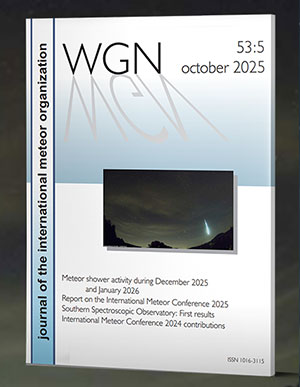Very favourable lunar conditions made this shower a highlight
target of 2001. Occasionally heightened activity is observed
from the Lyrids, most notably in 1982. The 2001 maximum exhibited
a slightly enhanced level of activity. Observations from
49 observers were collected by April 24, 0h UT. Such a large
number of observations monitoring a shower of moderate activity
is a fairly nice success of amateur meteor observing. The
table of the activity graph is given below.
The maximum is broad; highest rates are found near a solar
longitude of lambda = 32.0° with ZHR = 33±3. The first
peak at lambda = 31.7° comprises a number of novice observers
who may have underestimated their limiting magnitudes. Nevertheless,
the up-and-down or — more roughly speaking — the
general plateau shape of the activity profile appears to be
a typical feature of the 2001 Lyrids. This was already found
in recent Lyrid activity profile. This year, the plateau may
extend over as much as 24 hours. ZHRs in 2000 were lower, 20
at best, in 1999 near 30 as this year, but again significantly
lower in 1998 with values below 20.
---------------------------------------------------------- 2001 Time Sollong nObs nIND nLYR ZHR +/- Apr (UT) (J2000) ---------------------------------------------------------- 17 0620 27.295 2 1 0 3 3 19 0600 29.237 1 1 0 7 7 20 0130 30.030 1 1 3 3 2 20 2200 30.864 6 2 13 5 1 21 0140 31.013 8 5 30 8 1 21 1800 31.678 8 7 85 37 4 21 2130 31.820 18 13 155 28 2 21 2320 31.894 13 13 67 18 2 22 0000 31.922 10 10 128 28 2 22 0100 31.962 14 12 117 19 2 22 0230 32.023 10 10 90 33 3 22 0900 32.287 8 5 54 27 4 22 2130 32.795 3 2 19 24 5 23 2200 33.791 2 2 7 8 3 ----------------------------------------------------------
Solar longitudes refer to equinox J2000.0. nObs is the number
of individual observing periods, nIND is the number of individual
observers providing them, nLYR is the number of Lyrids
seen. The radiant position was assumed at alpha=271°, delta=+34°,
the population index used was r=2.9. The expectation value of the
ZHR,
ZHR = (1 + sum nLYR) / sum(Teff/C),
was used for the averages here, where Teff is the effective
observing time and C is the total correction composed of limiting
magnitude, clouds, and zenith correction. Times are rounded to
the nearest 10 minutes.
We are very grateful to the following observers for their
efforts and quick reporting of data:
ANTDU Dusan Antic (Serbia), MENHU Huan Meng (China),
ARLRA Rainer Arlt (Germany), MILAA Ana Milovanovic (Serbia),
BASLU Luc Bastiens (Belgium), MISKO Koen Miskotte (Netherlands),
BETFE Felix Bettonvil (Netherlands), MODAM Amruta Modani (India),
BHANE Neha Bhandari (India), NISMA Markku Nissinen (Finland),
BHASU Sushrut Bhanushali (India), PATSO Sonali Patil (India),
DECGO Goedele Deconink (Belgium), PEEBJ Bjorn Peeters (Belgium),
DEOPA Parag Deotare (India), PRAMA Mayuresh Prabhune (India),
DUBAU Audrius Dubietis (Lithuania), PUNNI Nilesh Puntambekar (India),
FANYU Yuwei Fan (China), RENJU Juergen Rendtel (Germany),
GADSH Shirish Gadkar (India), SAVBR Branislav Savic (Serbia),
GEOPE Petros Georgopoulos (Greece), SONWA Wanfang Song (China),
GEYBE Benny Geys (Belgium), SUNHU Huiming Sun (China),
GLIGE George Gliba (USA), TRIJO Josep Trigo-Rodriguez (Spain),
GOLDA Darja Golikowa (Germany), TUKAR Arnold Tukkers (Netherlands),
HASTA Takema Hashimoto (Japan), UCHSH Shigeo Uchiyama (Japan),
JOHCA Carl Johannink (Netherlands), VELKR Kristina Veljkovic (Serbia),
KULMA Manali Kulkarni (India), VERJN Jan Verbert (Belgium),
KULRH Rhikesh Kulkarni (India), VUJKA Katarina Vujic (Serbia),
KULVI Vineet Kulkarni (India), VUJRO Romana Vujasinovic (Serbia),
LANMA Marco Langbroek (Netherlands), WANSH Shuo Wang (China),
LINMI Mike Linnolt (USA), WISJE Jean-Marc Wislez (Belgium),
LUNRO Robert Lunsford (USA), ZERZO Zorana Zeravcic (Serbia),
MARAN Antonio Martinez (Venezuela), ZHUJI Jin Zhu (China),
MCBAL Alastair McBeath (UK) and ZUPLJ Ljubica Zupunski (Serbia).



 You saw something bright and fast? Like a huge shooting star? Report it: it may be a fireball.
You saw something bright and fast? Like a huge shooting star? Report it: it may be a fireball.  You counted meteors last night? Share your results with us!
You counted meteors last night? Share your results with us!  You took a photo of a meteor or fireball? You have a screenshot of your cam? Share it with us!
You took a photo of a meteor or fireball? You have a screenshot of your cam? Share it with us!  You caught a meteor or fireball on video? Share your video with us!
You caught a meteor or fireball on video? Share your video with us!